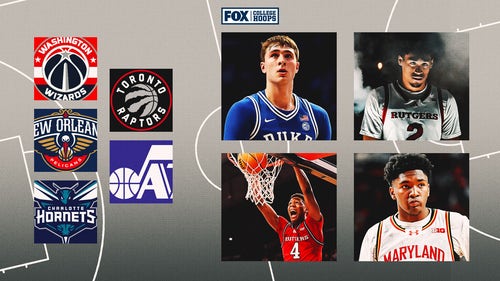
Harrison and Napier have emerged as clutch performers in own ways
ARLINGTON, Texas – There are not many people who can understand what it must be like right now to be Aaron Harrison, Final Four hero, newly discovered possessor of the so-called “clutch gene,” the Kentucky Wildcat getting asked at news conferences if he thinks the team’s fans are going to name their kids after him.
But in this tournament, there’s one other player who can probably relate: Shabazz Napier, the UConn guard whose "clutchitude” dial goes up to 11.
“Probably Harrison, when he was younger, would be on the court going ‘3 … 2 … 1 …’ and he’d shoot the ball,” Napier said Sunday. “And when you miss it, you’re going to say you got fouled and shoot free throws.”
This matter of the clutch gene -- once regarded as a self-evident truth -- is something sports fans debate now. There are even metrics across various sports that appear to indicate “clutchness” does not exist; some statistics indicate players are no more or less likely to perform well in pressure situations as they are otherwise.
For whatever reason, both Napier and Harrison have had a lot of success deciding games with shots down the stretch. Harrison has done it for the Wildcats three games in a row, including a deep 3 that brought Kentucky from two down to one up in the final seconds of its 74-73 national semifinal win over Wisconsin on Saturday.
”It’s just the best feeling in the world,” he said. “Of course, everyone knows when you’re a kid that you always dream of hitting the game-winning shot, so it’s just unreal to actually be able to do that in a big-time game.”
Game recognize game, as they say.
“He's got that clutch gene that everyone's been talking about,” Napier said.
Napier’s clutch badge was earned longer ago and has more supporting evidence. He’s a senior who, unlike the freshman Harrison, was not heralded as a just-add-Gatorade All-American. When he joined a UConn team that already had the heroic Kemba Walker on it, he had to wait for the opportunity to be a leader and then develop into one.
That’s what he’s done. In December, Napier hit a jumper at the horn to beat Florida. Last week, he hit a late 3, went 9-for-9 at the free-throw line, scored 25 points and generally looked a lot like Walker in leading UConn over Michigan State. In 2012, he beat Villanova with a 30-footer at the buzzer.
He did it with the support of Kevin Ollie, who is now UConn’s head coach but was an assistant when Napier arrived. Calhoun was the guy that broke you down, and Ollie was the one that built you back up.
”I never had a father in my life,” Napier said. “I feel like he was always a father figure to me. That's what I wanted. He believed everything I did was with a lot of passion. It may not be the right thing at the right time, but he understood that I gave everything I got. When you have somebody like that in your corner, you should always cherish that and me and him have just been growing up since.”
Harrison’s career arc has been rapid and less deep. Kentucky’s challenge has included sorting out roles on the fly. Harrison said the team has always gotten along well, but with an entirely new roster of high school All-Americans, it took a while for the Wildcats to work out who was supposed to do what.
As it turns out, Harrison is the guy you want taking the shot with the game on the line.
“Aaron has whatever it is to be successful in crunch time,” Kentucky guard Jarrod Polson said. “I think a lot of it is confidence. I think hitting those two shots before the last game was big for him to have the confidence to shoot that one against Wisconsin.”
Harrison has an identical twin whose basketball tools are also identical, according to their father, Aaron Sr. Yet Aaron is the clutch shooter, and Andrew is the point guard.
”They have the same skill set,” their father said. “Andrew is more of a giver.”
During the play that beat Wisconsin, Polson said, Andrew passed his brother the ball and told him to shoot it.
“He was like, ‘Go, go, go,’” Polson said. “I think having Andrew’s confidence in Aaron really helps Aaron have that confidence to hit that last shot.”
Harrison and Napier both did a little bit of demystification on the subject. It’s not magic. It’s courage.
“I think it’s just not being afraid to miss, really,” Harrison said. “You’ve got to want to take that shot, and want to be the guy to make that shot. If you’re not afraid to miss, you’ve got a good chance.”
That was more or less Napier’s take.
“To be successful,” he said, “you have to try. Sometimes when you try you fail and you move on to the next one.”
Monday night in Arlington, Texas, a national championship will be on the line and two clutch shooters just may be deciding it.
”Hopefully,” Napier said, “it doesn’t come down to his shot.”









